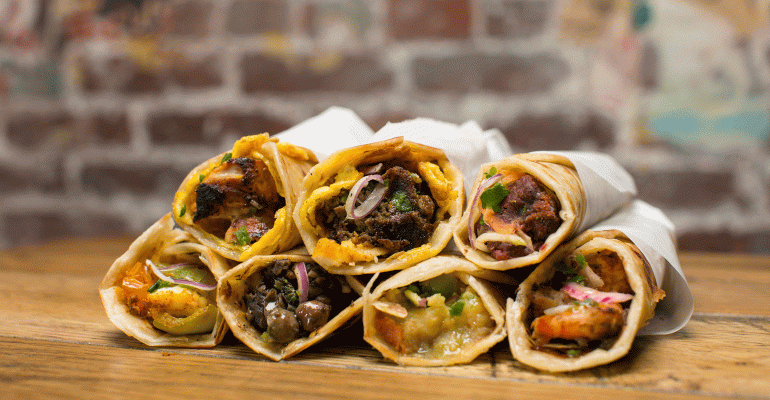For years, prognosticators have pronounced the arrival of the fast-casual Indian trend, yet only a handful of chains have been able to successfully scale. That’s in part because Indian food is complex and somewhat chef-dependent when done right, said Anil Bathwal, who co-founded The Kati Roll Company in New York nearly 15 years ago.
Still, the niche continues to offer hope that American consumers are ready to embrace South Asian flavors in a familiar fast-casual format. Operators are designing systems that will allow such restaurants to be multiplied. One common theme: many Indian concepts focus their menu on one type of food or cooking technique.

Curry Up Now
HQ: San Francisco
Units: 6, plus four food trucks
Founded: 2009
Average check: $15 -$18
Founders: Akash and Rana Kapoor and Amir Hosseini
Growing rapidly is Curry Up Now, which has been attracting franchise operators from the quick-service segment who see an opportunity as Indian cuisine becomes more popular in the U.S.
The concept was founded by husband-and-wife team Akash and Rana Kapoor and Amir Hosseini, who serves as senior vice president of operations. The idea is to offer traditional flavors in a friendly, recognizable format. The menu includes a tikka masala burrito, a “deconstructed” samosa and kathi rolls. Ingredients are organic where possible and never frozen, and proteins are halal and raised without antibiotics or added hormones.
Two outlets have a cocktail bar called Mortar & Pestle, and the company additionally has a catering arm. Curry Up Now accelerated growth when it acquired Tava Kitchen, a competing fast-casual Indian concept, in 2016. Franchise deals have been signed to bring the brand to Southern California and the Sacramento area.

Tarka Indian Cuisine
HQ: Austin, Texas
Units: 8
Founded: 2009
Average check: About $11
Co-founders: Tinku Saini, Rajina Pradhan, Kaval Bombra, Navdeep Singh, Balinder Singh
With restaurants across Texas, Tarka Indian Cuisine debuted in Austin with the goal of making Indian cuisine convenient and affordable. The fresh-to-order menu includes build-your-own curries, kebabs, biryanis and “naaninis,” or naan stuffed taco-style with curried chicken, shredded lamb or aloo gobi, served with masala fries or salad.
A ninth location is under development in Austin and the company expects to reach Dallas by 2019.
“The immediate goal is to get to 15-plus locations in the next 24 to 30 months and bring on outside investors to help us grow our store count exponentially after that,” said Saini, co-founder and CEO. “We believe the United States alone will be able to support over 250 locations.”
Tarka will remain company owned.
“It’s not easy to do fresh-to-order, high-quality ingredients in under 10 minutes,” he said.
The company is looking to use a commercial kitchen to replicate some sauces to help it scale, as well as building a potential retail line of products that could eventually appear in grocery stores.

Choolaah Indian BBQ
HQ: Pittsburgh
Units: 5
Founded: 2012
Average check: $12
Owner: Wholesome International
Co-CEOs: Raji Sankar and Randhir Sethi
Founded in 2012, the first Choolaah restaurant was launched by Wholesome International in Cleveland, in 2014. The multiconcept group is also a franchisee of Five Guys Burgers and Fries.
Choolaah is designed to make Indian flavors accessible in a modern, fine-casual setting. Central to the menu are 600-degree tandoor ovens, which are on display behind glass windows that expose the open kitchen. Options are built around proteins and tandoori vegetables, including chicken, salmon, lamb meatballs, paneer, tofu and veggie croquettes as a bowl or salad.
With units in Ohio, Pennsylvania and Virginia, Choolaah plans to expand in existing markets and throughout the East Coast and Mid-Atlantic regions.

The Kati Roll Company
HQ: New York City
Units: 6
Founded: 2002
Price range: $3.85-$8.90 per roll
Average check: $20
Owners: Payal Saha and Anil Bathwal
This concept puts the Calcutta-inspired street food of kati rolls front and center. Flatbreads are made daily by hand, spices are ground from whole and the ingredient list leans organic. New to the menu is a Kosha Mangsho Roll, featuring slow-braised mutton seasoned with Benghali spices, wrapped in flatbread with red onions, bird-eye chiles and lime juice. Beverages include a Mishti Doi Lassi made with fermented sweet yogurt and date-palm sugar reduction.
The focus on kati rolls was simply because co-founder Payal Saha, who is originally from Calcutta, missed them. But they have also found favor with Millennials who love portable, take-out-friendly options.
“It’s been a bit of a challenge because Indian food is defined for most people as curry and rice,” which The Kati Roll Company doesn’t serve, said Anil Bathwal, who co-founded the chain with Saha, his wife. “People come in and say, ‘What do you mean you have no curry?’ But we believe the kati roll is a perfect way to introduce Indian food. It’s like a sandwich.”
The Kati Roll Company has five units in New York and one in London. A seventh unit is scheduled to open in New York this summer, and the company plans to launch franchising in the fourth quarter, with up to 40 more restaurants planned by 2020.




